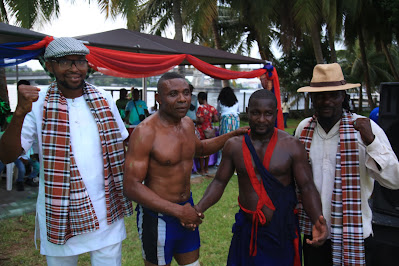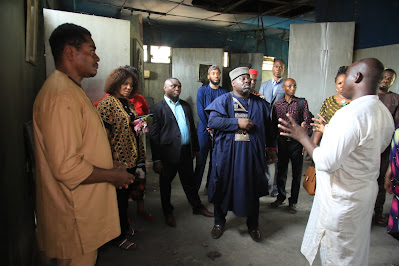By Sunday Edum
Preamble
Live theatre serves as a reflective mirror of society, capturing its complexities, disparities, and struggles on stage. In Nigeria, a nation grappling with profound inequality, high unemployment, and widespread poverty, artistic expression emerges as a voice for the marginalized and a platform for critical dialogue. Ola Rotimi's seminal work, "Holding Talks," performed at the esteemed University of Port Harcourt's Arts Theatre (The Crab), embodies this fusion of artistry and social commentary.
The politically charged atmosphere of Nigeria, marked by deep-seated disparities and systemic injustices, provides fertile ground for artistic exploration and introspection. The diverse audience, comprising political figures, business leaders, students, and academics, eagerly gathered at The Crab to witness the artistic spectacle orchestrated by the visionary cast and crew under the astute direction of Kelvin Melvin.
In Rotimi's evocative narrative, unfolding within the confines of a humble barbershop, the struggles of society manifest through the vulnerable and impoverished barber. The entrance of the privileged man catalyzes a succession of tragic events stemming from a fatal bet on the barber's trembling hand, symbolizing hunger. As the barber succumbs to starvation and neglect, the man's diversion to petty arguments with the apprentice epitomizes societal apathy towards pressing issues. The futile interventions of journalists and the police further underscore systemic failures and societal indifference, unveiling layers of corruption, poverty, and leadership shortcomings entrenched in Nigerian society.
Holding Talks in Performance:
The directorial finesse of Melvin Kelvin in staging Ola Rotimi's Holding Talks is a testament to the electrifying contributions that shaped the artistic landscape of the production. Kelvin's meticulous use of space and movement demonstrated the expertise of a skilled director, enriching the visual narrative and the overall impact of the play. The thoughtful choreography of actors within the space created dynamic and visually compelling scenes that captivated the audience, breathing life into Rotimi's narrative.
Kelvin's adept control over picturization and composition added depth and richness to the storytelling, offering an immersive experience for spectators. The atmospheric lighting design further accentuated the mood and tone of the production, setting the stage for the exploration of corruption, poverty, and societal indifference. The incorporation of a chorus, using appropriate and inappropriate songs to set the mood, elevated the entertainment value of the play and engaged the audience on an emotional level. The chorus not only enriched the narrative but also heightened the entertainment aspect, delivering a unique and immersive experience for the audience.
The portrayal of characters in Ola Rotimi's performance was a masterclass in immersive and believable acting, breathing life into the poignant narrative of corruption, poverty, and societal indifference. Joseph Alaibe's portrayal of Man, the philosophical character, was nothing short of captivating. His embodiment of philosophical depth and nuances was a testament to his mastery of the craft. Alaibe's adept use of voice modulation, body language, and utilization of the performance space showcased a profound connection with the essence of theatre, engaging both co-actors and the audience seamlessly. His comic delivery and profound understanding of philosophy added layers to the character, resonating with Constantine Stanislavsky's Method acting principles. Similarly, Akoko Ezekiel Digha's portrayal of the character of Apprentice exhibited a mechanical and exploitative demeanour, adding complexity to the character's interpretation. Although his portrayal was forceful and engaging, it was almost overshadowed by the commanding stage presence of Joseph Nnana Alaibe, highlighting the dynamics between the characters. Digha's psychic aura, complexion, and physicality added depth to the character, creating a palpable contrast within the ensemble. Abraham Nnamdi Chika's dramatization of Barber brought forth a fitting representation of the role, embodying vulnerability and societal struggles effectively. His makeup and costume choices enhanced the character's contrast with Man, the capitalist figure, underscoring the socio-economic themes of the play. However, Chika failed to maintain breath control from when he collapsed to the production's conclusion, which is a call for improvement in his dedication to the performance.
The dynamic performances of Joseph Alaibe, Akoko Ezekiel Digha, Abraham Nnamdi Chika, Jaja Godspower as photographer, Njoku Favour as policewoman, Njoku Christine Nmesoma Nkechinyereugo, and Chukwusa Ruth Onari, as reporters in Melvin Kelvin’s interpretation of Rotimi’s 'Holding Talks', exemplified a synergy of talent, dedication, and artistic vision, bringing to life the complexities of Rotimi's narrative. Their adept portrayal of characters, commitment to their roles, and ability to evoke profound emotions within the audience underscored the power of live theatre in provoking thought, sparking dialogue, and resonating with the human experience.
Conclusion
The synergy of talent, dedication, and artistic vision displayed by the cast in Melvin Kelvin's interpretation of Rotimi's Holding Talks transcended the boundaries of mere entertainment, offering a profound social critique that spurred introspection and dialogue. The rich tapestry of storytelling, augmented by nuanced character portrayals and seamless interactions, immersed the audience in a world of social commentary and reflection, underscoring the transformative power of live theatre in provoking thought and inciting change within society. As the actors breathed life into Rotimi's timeless narrative, they left an indelible impact on the audience, fostering a collective call for societal empathy, justice, and progress in the face of adversity.
Dr. Sunday Edum
Senior Lecturer
Department of Theatre and Film Studies
Associate Dean, Student Affairs
University of Port Harcourt, Nigeria





































